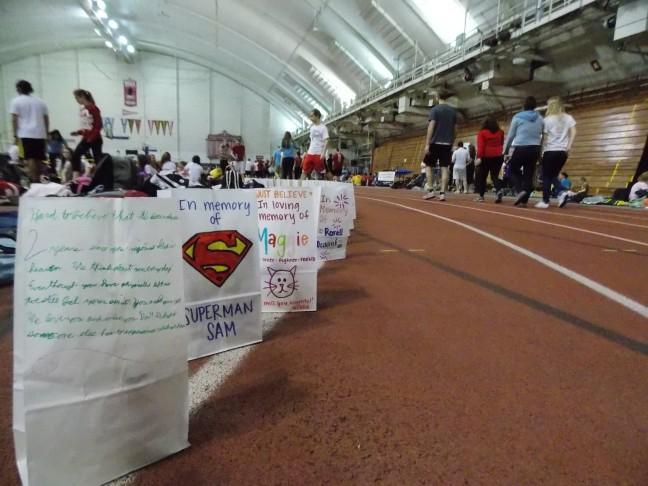As Maggie Stewart led fellow Badgers around the track in the Survivors’ Lap at University of Wisconsin’s Relay for Life event Friday, she said she had not expected to feel so empowered and like she was actually making a difference.
Stewart, a senior studying wildlife ecology, was diagnosed with a type of brain cancer last February.
After waking up on a typical Friday morning for an exam, Stewart had a strong headache and throughout the course of the day she said the pain progressed down the right side of her body.
When Stewart went to University Health Services, the doctor suggested she get an MRI so she met with her family physician the following day and was told she had a mass in her brain, she said. After receiving a biopsy, Stewart was told she had a brain tumor and since then she said she has been on a 12-cycle, six-week regiment of oral treatment.
After leading the Survivor’s Lap, Stewart spoke before the Luminaria Ceremony.
“I didn’t expect Relay to feel like you were actually fighting, I just thought it was going to be walking around a track,” Stewart said. “But once you’re here, you can tell you are making a difference.”
A record breaking turnout of 1,589 Badgers gathered Friday at the event to honor cancer survivors, remember lost loved ones and fight back against the disease.
The event was held at the Camp Randall Memorial Sports Center and was organized by the UW chapter of Colleges Against Cancer. A total of 170 teams raised $151,629 for the American Cancer Society, Caitlin DeVos, senior advisor for UW’s Colleges Against Cancer’s leadership team, said.
Relay For Life is an overnight community fundraising walk where teams can set up camp around a track and take turns taking laps to raise money for cancer research, its website said.
“No matter what our experience with cancer has been, we all share the hope that we will one day live in a world where our children, and their children, will never have to hear the words, ‘You have cancer,’” a CAC member said at the event.
According to the American Cancer Society, cancer remains the most common cause of death in the United States, accounting for nearly one of every four deaths nationwide.
In June, Stewart was able to continue her studies at UW, and she plans to graduate next December. She said she was overwhelmed by the way her support system grew after she was diagnosed, both back at home and in Madison.
DeVos is a close friend to her and Stewart said she “still tears up” because DeVos named her Relay team “Strides for Maggie” in support of her battle with the disease.
Since the group began in 2001, DeVos said the Madison chapter of CAC has raised more than $1 million in total toward cancer research.
“Cancer makes you feel helpless. Relay For Life leaves you feeling empowered,” DeVos said.


